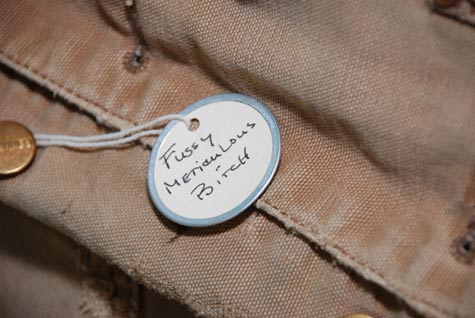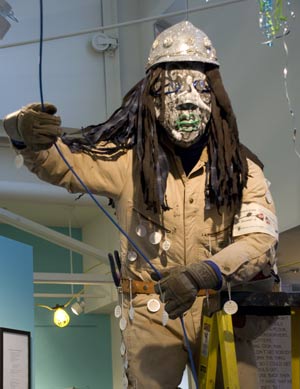On Equal Terms: Women in Construction 30 Years & Still Organizing at the Adams Gallery at Suffolk University.
By IAN SANDS | February 9, 2009

On Equal Terms: Women in Construction 30 Years & Still Organizing |
In 1978, the federal government under President Jimmy Carter put forth timetables and goals aimed at increasing the number of women and minorities in the construction industry. The Department of Labor predicted that under the new federal guidelines, the percentage of women in the construction industry would grow exponentially, so much so that by the year 2000 a quarter of the total construction workforce would be women. | On Equal Terms:Women in Construction 30 Years & Still Organizing | by Susan Eisenberg | Adams Gallery in David J. Sargent Hall, First Floor, Suffolk University Law School, 120 Tremont Street, Boston | 9 am-7 pm daily | through March 17, 2009 | 617-305-1782 |
The estimate was so far off base, it didn't even come close to reality. According to the US Bureau of Labor Statistics, the number of women in the construction and extraction industry in 2007 averaged out to a measly 2.7 percent. In Boston, the figures are even more dismal. A recent Transportation Equity Network study found that in 2006, the percentage of women in this city's construction industry equaled just one percent.
In order to shine some light on the inequality – as well as call attention to the strong, talented tradeswomen who wire this country's buildings, lay out piping systems, and fabricate metals – the local artist and poet Susan Eisenberg, herself a pioneering tradeswoman who came into the business in 1978, has unveiled On Equal Terms: Women in Construction 30 Years & Still Organizing at the Adams Gallery at Suffolk University. The exhibit features poetry, found materials, sculpture, audio, and photography and was previously on display at the Women's Studies Research Center gallery at Brandeis University, where Eisenberg is a visiting artist scholar.
On Equal Terms highlights how unaccommodating the construction industry has been towards women, then and now. One of the pieces, a life-size bathroom shack outfitted with crude, misogynistic graffiti, calls to mind the difficulties women have had in obtaining access to better bathroom facilities on the job. But the exhibit is not without its lighter moments, from an area where gallery goers can try on hard-hats in the mirror, to a collection of T-shirts from women's trade groups across the country. We chatted with the artist by phone last week about the contradictory nature of her exhibit as well as her own experience as a trailblazer in her industry during the Seventies.

Stella |
Much of the work you've done over the course of your career as a poet and artist has been to do with labor issues. Tell me about how you got on this tack.
I come out of the construction industry. I worked 15 years as an electrician on union job sites in this area. I came into the industry in 1978 at the beginning of affirmative action when there were high expectations that women would begin to enter the trades, and that the industry would change. That really didn't happen.
 Related
Related:
Brandeis shutters art museum, It's a shandeh!, Flipping out, More 
- Brandeis shutters art museum
Late Monday afternoon, Brandeis University informed leaders of its Rose Art Museum that it would close the institution this summer and auction off the more than 6000 pieces in its renowned collection, which includes major works by Andy Warhol, Robert Rauschenberg, Roy Lichtenstein, and Jasper Johns.
- It's a shandeh!
The news that Brandeis University plans to shutter its highly regarded Rose Art Museum and sell its exemplary collection of American art from the 1960s and '70s in order to resolve its budget crisis not only shocked the world of elite higher education, it also stunned the local, national, and international arts communities.
- Flipping out
Status Quo is assuredly not a breaking crew. They do incorporate some breakin' and krumping in their sets, but, in their own words, they are entertainers first.
- Will Brandeis lose its swagger?
Ethnomusicologically invigorated Brandeis students and alumni are hoping for an outburst of criticism for the probable downsizing of Wayne Marshall.
- Will Brandeis sell out the Rose?
Will Brandeis take the money and run?
- Brandeis President Jehuda Reinharz steps down
Fallout from Bernie Madoff's titanic scheme is still unfolding, as was made clear on this week's 60 Minutes report about the search for billions bilked by the New York Ponzi king.
- Phoenix critic wins grant
It was announced earlier this week that Phoenix contributing writer Greg Cook's art blog, the New England Journal of Aesthetic Research, has been awarded a $30,000 endowment from the Creative Capital/Warhol Foundation Arts Writers Grant Program, which rewards "commitment to the craft of writing and the advancement of critical discourse on contemporary visual art."
- When worlds collide
We humans are quick to anthropomorphize the non-human.
- Beijing bounce
All three candidates declared that if the Chinese don’t change their attitudes about Tibet in a hurry, President George W. Bush should boycott the opening ceremony of the Olympics in Beijing.
- Proponents make the case for National Popular Vote
During a fundraiser for FairVote Rhode Island at the Hi-Hat on Monday, supporters of the concept known as National Popular Vote several times used the acronym NPV with a wink and a smile, eliciting the question from a colleague, "What's NPV?," and then offering the all-too obvious answer.
- Review: Wild Child
Like others who toil in the classroom (I’m a long-time film-studies professor at Suffolk University), I constantly fret over whether all those semesters of teacher talk have made a bona fide dent in students’ lives.
- Less

 Topics
Topics:
Museum And Gallery
, Jimmy Carter, Rudolph Giuliani, Brandeis University, More  , Jimmy Carter, Rudolph Giuliani, Brandeis University, Brandeis University, Suffolk University, David Dinkins, U.S. Bureau of Labor Statistics, Less
, Jimmy Carter, Rudolph Giuliani, Brandeis University, Brandeis University, Suffolk University, David Dinkins, U.S. Bureau of Labor Statistics, Less 